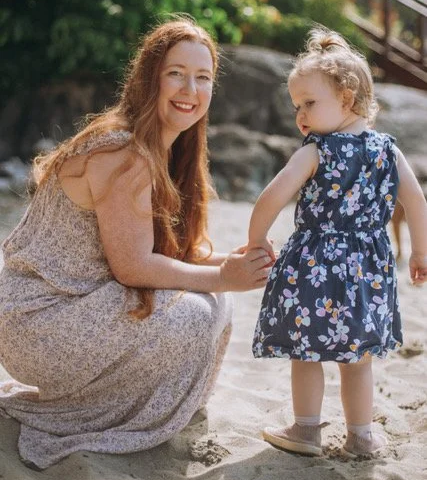Newborn Sleep: Creating Sustainable, Flexible Routines From the Start
This guest post is written by Teresa SedlmaiR, from Little Trees Sleep Consulting
The newborn stage is full of firsts—and lots of learning stages. Your baby is brand new to this world, you are recovering still from birth and you are both just getting to know each other. If you’re reading this with a newborn in your arms (or strapped to your chest while pacing the kitchen), know this: you’re doing a great job.
Newborn sleep is often unpredictable and erratic, and that’s okay. You don’t need rigid schedules or sleep training at this stage—but there are gentle, supportive ways to help your baby develop healthy sleep habits that work for your family. As a baby sleep consultant based in Vancouver, I help parents find a rhythm that’s both sustainable and flexible—because newborn life is anything but one-size-fits-all. I have seen so many parents with newborns riddled with anxiety because they are trying to “get it right” and “perfect” it when in actuality, there is no such thing as one right thing at this stage.
The Truth About Newborn Sleep
Let’s start with the basics: newborns are not born with a circadian rhythm. This means they don’t yet have a strong sense of day vs. night, and their sleep-wake cycles are still developing. It’s completely normal for newborns to have irregular sleep in the first few weeks.
However, with a few simple practices, you can begin laying the foundation for your baby’s biological clock to take shape—helping them organize their days and nights, and eventually consolidate longer stretches of sleep at night, especially once melatonin output comes into play.
Start With Wake Windows, Not a Schedule
In the newborn stage, trying to stick to a rigid schedule can be frustrating and unrealistic. It can be a serious trigger to a moms anxiety as it may make her feel that she is failing when she is absolutely not. Instead, flow through your days based on wake windows—the amount of time your baby can comfortably stay awake between sleep periods and don’t worry about nap lengths. They will be erratic. So many schedules out there have newborns taking multiple 2 hour naps when many just will not do this, no matter what you try.
Wake windows for newborns (0–12 weeks) typically range from 45 to 90 minutes, depending on your baby’s age and temperament. Keeping an eye on these wake windows helps ensure your baby isn’t getting overtired or under-tired—both of which can lead to fussiness and disrupted sleep.
Tip: Try to offer naps before your baby becomes overtired, even if they don’t seem super sleepy. At this age, sleep pressure builds quickly! Start settling them to sleep 10 minutes before the wake window ends.
Cap Naps to Protect Night Sleep
While naps are essential for newborns, capping long daytime naps (especially those over 2 hours) helps protect night sleep. If your baby is snoozing for long stretches during the day, it can shift their longest stretch of sleep to the wrong part of the 24-hour cycle—aka when you’re trying to sleep! Even newborns need only a certain amount of sleep in a 24 hour period, so if they are getting it all in the day, most likely they will make up for that lost wake time in the night or early morning.
Tip: Gently wake your baby if a single nap goes past 2 hours, and aim to offer more frequent, shorter naps throughout the day. This helps organize daytime sleep and increases the likelihood of that coveted longer stretch of sleep happening at night. It will also insure that they are getting enough wake time since wake windows are so short. Therefore, more naps equal more wake windows.
Help Your Baby Learn Day vs. Night
Because newborns don’t yet produce melatonin in sync with the 24-hour clock, you can help set their internal rhythm by using environmental cues:
Daytime: Keep lights on, talk to your baby, play music, and go outside. Natural daylight is one of the strongest anchors for setting your baby’s circadian rhythm. Naps can also still happen in a dark room but during awake time, light is your friend!
Nighttime: Keep things dark, quiet, and calm. Use a consistent bedtime routine—even if it’s short and simple (e.g., bath, feed, swaddle, cuddle). A bedtime routine will also start to cue their brains that night sleep is beginning.
These small cues help your baby start to connect longer sleep with nighttime, which is the first step toward organized sleep.
Naps Can Happen On the Go
At this stage, don’t stress about all naps happening in the crib or bassinet. It’s completely okay for newborn naps to happen in the stroller, baby carrier, or on your chest. Your mental health matters, too—and getting out of the house during the day can be a game-changer. What’s most important is that your baby is getting enough sleep overall, not that it happens in the “perfect” spot every time.
Tip: One crib nap a day (even a short one) is great practice for when you’re ready to build more consistency. The morning nap is when sleep pressure is the highest so this a great one to focus on. But otherwise, feel free to be flexible—especially if it helps you feel less stressed and in a better place mentally.
It’s Okay to Soothe Your Baby to Sleep
There’s a lot of pressure in the modern parenting world around “bad habits” and “spoiling” your baby—but I want to reassure you: it is absolutely okay to soothe your newborn to sleep.
Whether that’s rocking, feeding, contact naps, or bouncing on a yoga ball, these are all developmentally appropriate ways to help your baby settle in the early months. You are not creating bad habits—you’re meeting your baby’s needs.
As your baby grows, you can slowly introduce more independent sleep skills when the time feels right and if you feel that sleep training is the right path for you. Around 12 weeks is when babies are usually ready for this shift as their sleep cycles mature and their circadian rhythm is established.
Final Thoughts
The goal during the newborn stage isn’t perfect sleep—it’s sustainable sleep. Creating a rhythm that respects your baby’s biology while supporting your wellbeing is the key.
As well, building those restful longer stretches at night so that you have more energy to get through those long days. Watch wake windows. Cap long naps. Embrace flexibility. Use light and darkness to guide your day. And most importantly—give yourself grace. If sleep isn’t going the way you expected, that doesn’t mean you’re doing anything wrong.
If you’re feeling unsure about how to support your baby’s sleep in these early weeks, I’m here to help. As a Vancouver sleep consultant working with families locally and virtually, I offer personalized guidance to help you find your rhythm—without pressure, shame, or one-size-fits-all advice.
Teresa SedlmaiR
Teresa Sedlmair, a Certified Paediatric Sleep Consultant, is the owner of Little Trees Sleep Consulting and mom to 2 little girls ages 3 and 5 named Hazel and Maple. She has supported hundreds of families in the Greater Vancouver Area with children ages newborn to 5 years old to help them feel well-rested again.





